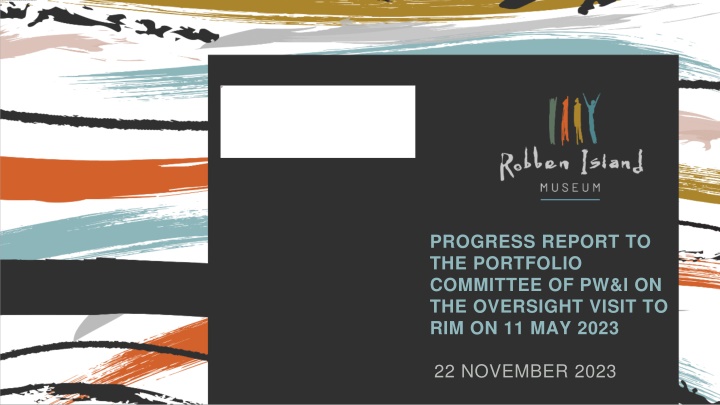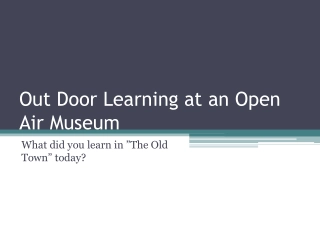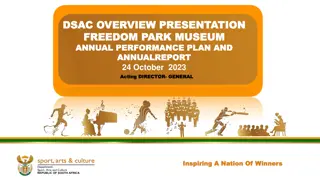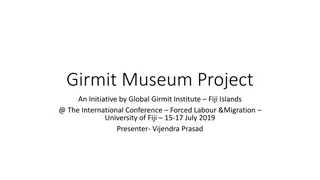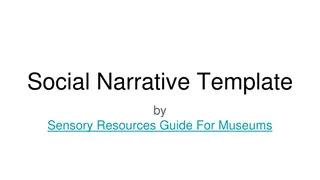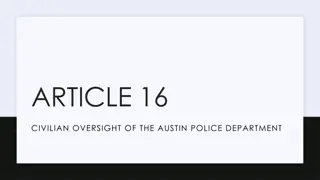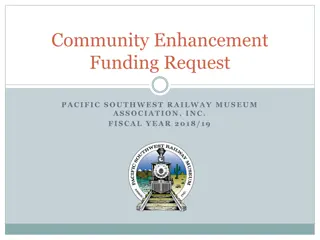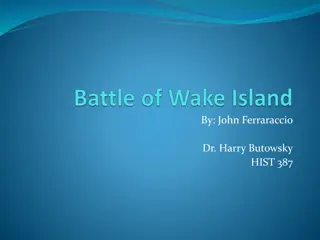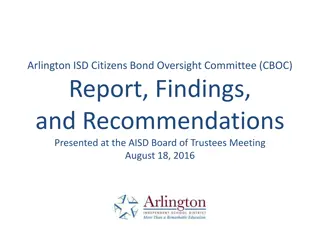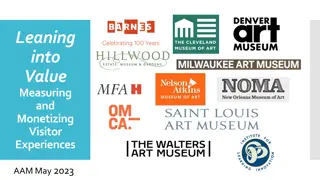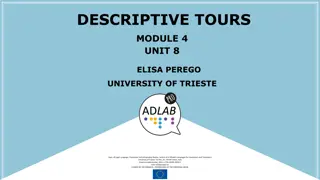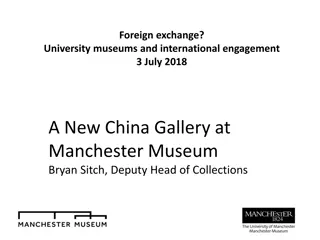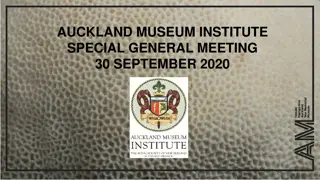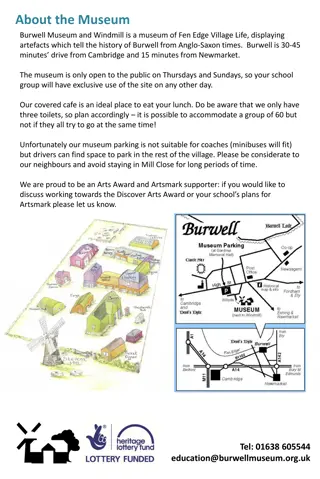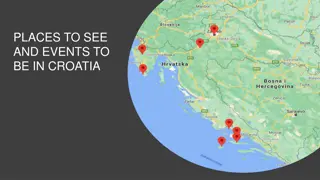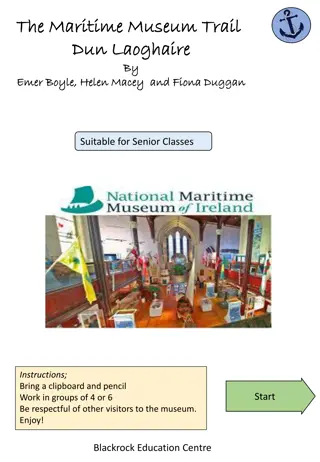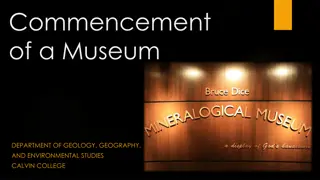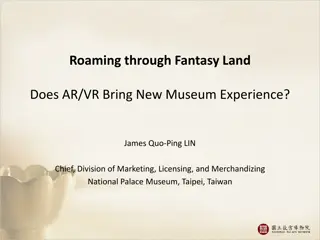Progress Report on Oversight Visit to Robben Island Museum
The progress report presented to the Portfolio Committee of PW&I on the oversight visit to Robben Island Museum highlighted challenges such as power generation limitations, water sustainability issues, capital projects, and partnerships. Recommendations were made to address these challenges, including improving power generation systems, addressing water availability, prioritizing capital projects, and enhancing partnerships with state entities. The report aims to update the Committee on the actions taken by RIM to overcome the identified obstacles.
Download Presentation

Please find below an Image/Link to download the presentation.
The content on the website is provided AS IS for your information and personal use only. It may not be sold, licensed, or shared on other websites without obtaining consent from the author.If you encounter any issues during the download, it is possible that the publisher has removed the file from their server.
You are allowed to download the files provided on this website for personal or commercial use, subject to the condition that they are used lawfully. All files are the property of their respective owners.
The content on the website is provided AS IS for your information and personal use only. It may not be sold, licensed, or shared on other websites without obtaining consent from the author.
E N D
Presentation Transcript
PROGRESS REPORT TO THE PORTFOLIO COMMITTEE OF PW&I ON THE OVERSIGHT VISIT TO RIM ON 11 MAY 2023 22 NOVEMBER 2023
1. TABLE OF CONTENT 2. PURPOSE 3. INTRODUCTION 4. SUMMARY OF CHALLENGES IDENTIFIED DURING THE OVERSIGHT VISIT 5. POWER GENERATION LIMITATIONS 6. WATER SUSTAINABILTY CHALLENGES 7. CAPITAL PROJECTS & FUNDING 8. PARTNERSHIPS 9. OTHER MATTERS AND CONCLUSION
2. PURPOSE The purpose of this presentation is to take the Committee into confidence about the progress Robben Island Museum (RIM) is making against the challenges identified during its 11 May 2023 oversight visit to the western cape small harbours of which Robben Island Museum was one of. 2
3. INTRODUCTION Visit to Robben Island Museum On 11 May 2023, the Portfolio Committee on Public Works and Infrastructure undertook an oversight visit to Robben Island Museum at its V&A Waterfront office, where it received briefings from RIM, DSAC and the Department of Public Works and Infrastructure (DPWI) officials. During the Committee oversight visit and the resultant interface, some challenges facing RIM were raised and discussed by Committee members, with recommendations made for actioning by RIM and DPWI. It is against this background that RIM is briefing the Committee on the progress it is making to address those challenges. 3
4. SUMMARY OF CHALLENGES IDENTIFIED DURING THE OVERSIGHT VISIT The challenges identified are as follows: Power generation limitations and the high dependency on diesel usage Water availability and sustainability challenges Capital projects due to maintenance backlog and reprioritisation of funding for the current financial year to address the challenges and unlock revenue generation Remedial maintenance works to enable efficient narration and exhibition for visitor experience Progress on partnerships with other state entities to address unfunded mandates and expected outcomes 4
5. POWER GENERATION LIMITATIONS
5. INADEQUATE POWER GENERATION & LIMITATIONS 5.1 Power Generation: a) Solar Plant, The Island operates fully off-grid from the mainland power supply. The solar plant and generator system are inter- linked and there is a power converter point that charges the solar battery pack for power distribution to all facilities. In order for the Island to go fully green, it needs to increase the battery pack capacity by 60% from the current 40%. This will result in the rreduction of generator/ diesel reliance for power generation at night and increase in load production during the night. The battery pack augmentation is due to be implemented in Q3 of FY 23/24 at a cost of +R7 million once SCM processes are finalised. b) Generators, The planned maintenance and servicing of the generators by the DPWI appointed contractors is currently proceeding as scheduled. The four (4) 450kVA generators that were out of commission have since been brought back to adequate functionality and are feeding power to all the connected facilities. 6
6. WATER SUSTAINABILITY CHALLENGES
6. WATER SUSTAINABILITY CHALLENGES 6.1 Water Supply: a) Boreholes and Non-portable water, Water scarcity on the island remains a challenge. Water has to be ferried from the mainland to the Island every two weeks, which has costs implications that RIM now has to absorb. This has led to some tours being cancelled at the initial stages as RIM is continuously receiving and managing volumes of tourists on the island while there is insufficient water available for ablution facilities. RIM has resuscitated three of the eleven boreholes on the Island. The three were identified to have a high water table so extraction was not complex. Lab tests are currently being undertaken on the remaining eight boreholes. The three resuscitated boreholes are currently producing 800 - 1,000 litres per hour each, per day. The remaining seven boreholes will produce an additional +6,000 litres per hour, per day given the projected increased visitor numbers expected from November until February before the Easter peak season. 8
6. WATER SUSTAINABILITY CHALLENGES - CONTINUED 6.1 Water Supply: a) Boreholes and Non-portable water, continued.. During peak season (December March), RIM will continue to transport non-portable water from the mainland until such time that total stabilisation in the supply of water is achieved in all buildings especially those that are highly utilised which is mainly the visitor sites. The costs incurred so far on the purchase and transportation of water is around R300,000. As is always the norm during every peak season, mobile ablutions will also be rented. Reservoir 1 has a capacity of 1 million litres and has been commissioned and fully decontaminated with the water being produced from the current desalination plant. The water is now being diverted to the various buildings to clean up the internal piping of the facilities. During normal - low seasons, water consumption has been captured at +75,000 - 90,000 litres per day and at +120,000 - 150,000 litres per day during peak season (mid Dec end of Jan). Reservoir 2 which has a maximum capacity of 900,000 has also been commissioned and currently being decontaminated. 9
6. WATER SUSTAINABILITY CHALLENGES - CONTINUED 6.2 Water Supply: b) Existing Desalination Plant, Since the installation of the new membranes and filters in August October 2023, the desalination plant continues to have intermittent challenges which the appointed DPWI maintenance contractor (Allfix) is struggling to manage effectively. This is due to the fact that the new components are not compatible with each other in relation power capacity and design as the work undertaken by DPWI seems to have been a patch work exercise. Therefore, as a result of these challenges, Graham Tek which is the Original Equipment Manufacturer (OEM) of the current desalination plant was engaged to assist management with a detailed analysis of the current plant. The analysis looks at the capacity and how that can be augmented as well as to determine the actual life span and sustainability of the plant for the next 5-10 years in line with the initial design drawings and maintenance plan. This will assist to determine the actual short to medium plan in terms of whether to continue with the plan of procuring a new water treatment plant and how it should be procured. The draft analysis report has indicated a remedial plan at a cost of +R3.5 million with a 14 weeks time span from procurement to completion. 10
7. CAPITAL PROJECTS & FUNDING
7. CAPITAL PROJECTS AND FUNDING 7.1 Capital and Operational Grant The DSAC conditional grant on infrastructure capital works totalling R71.732m has been committed for projects implementation and practical completion of the 23/24 UAMP projects earmarked for end of Q4 23/24 FY. By end of March 2024, 65% - 70% of the grant funding will have been utilised with the remaining committed to long term capital projects already underway. There is also DSAC operational grant allocation of R1.37 million for environmental management and R9.137 million for diesel on the island for the 2023/24 financial year. 7.2 Capital Projects Stages 1-2 of the identified adaptive reuse projects (the MPLC, the Guest House, the five Houses along the village precinct and Alpha 1 interior works) have been completed and equate to 40% of progress at a cost of R3 million of budget spent for this programme. The next stages (3-6) of the remaining scope sits at 55% to practical completion at end of March 2024 with the remaining budget at R14 million of which, the remaining 5% is snagging post practical completion. 12
7. CAPITAL PROJECTS AND FUNDING - CONTINUED 7.3 Rehabilitation and restoration of facilities for interpretation & visitor experience Intensive remedial maintenance works are also at the design stage and construction works for phase 1 facilities is earmarked for completion at the end of the 2023/24 financial year at a budget allocation of +R15 million of which +R2.5 million has been spent. 7.4 Construction constraints due to DFFE directives and compliance to SAHRA Due to the Island also being classified as a Marine Protected Site, the implications of this directive extend to when and how construction works can be implemented on the Island. As per current laws, intensive construction cannot be effected from May August in order not to interfere and disrupt the breeding season of the varied bird species on the Island. The consequence of this is a short construction window period which affects project/s delivery timelines. Robben Island is a heritage site and as such, before any construction can commence, the approval process from SAHRA has to be factored into the delivery timeline and alignment with the DFFE directive can be a challenge. 13
7. CAPITAL PROJECTS AND FUNDING - CONTINUED 7.5 Contribution to job creation through projects underway The current indirect jobs created due to the implementation of the capital projects currently sits at 31 jobs of which 85% comprises of the preferred target groupings as identified in the relevant Government legislation. When physical construction commences, this figure will increase exponentially a consolidated summary for the 23/24 FY will be available. In the past financial year 2022/23 job creation was as follows: 14
8. PARTNERSHIPS
8. PARTNERSHIPS 8.1 Stakeholders RIM has established partnerships with various government department and entities to provide a holistic protection and upkeep of the Island. The SAPS is one such stakeholder whose support is sought in deterring criminal activities especially the illegal poaching along the RIM waters. Talks are underway for the SAPS to have a satellite presence on Robben Island. Another relationship that has been entered into is that with Infrastructure South Africa to assist RIM with the bulk infrastructure constraints to support the unlocking of other heritages sites for interpretation. While awaiting the appointment of a contractor to execute maintenance works on the Island, RIM and DPWI Regional Office are working together through the EPWP general workers who have been availed by DPWI to undertake horticulture services in the interim. 16
8. PARTNERSHIPS 8.2 RIM, DSAC and DPWI Partnership a) General Maintenance, As a World Heritage Site, Robben Island has to maintain its outstanding universal value as a site of humanity. Its integrity and authenticity must remain. For this to happen, maintenance of the site is sacrosanct. DPWI has allocated a maintenance budget of R152 million over three years. b) RIM as Implementing Agent for DPWI, To speed up service delivery on the Island, RIM has proposed that DPWI relinquish its maintenance mandate together with the allocated funding to RIM to officiate the works as its Implementing Agent. DPWI will still have the overarching oversight responsibility as the custodian of the site. This proposed re-structured model is legally allowed for in the GIAMA Act. c) Steering Committee, The steering committee was resuscitated in June 2023 after one year of not sitting and the last meeting held was in July 2023. RIM and DSAC continue to hold monthly oversight meetings to monitor, mitigate risks and speed up the maintenance and implementation of projects. 17
9. OTHER MATTERS AND CONCLUSION
9. OTHER MATTERS AND CONCLUSION 9.1 Other Matters: a) Asbestos, In (July August 2023) the DPWI commissioned an asbestos removal scoping and financial feasibility exercise of which, the outcome has still not been shared with RIM and DSAC. In the past two months, RIM has completed and disposed of asbestos debris from the Island. 9.2 Conclusion: Maintenance and upkeep of the Island s built and natural environment is a huge undertaking. RIM needs full participation from all the stakeholders to implement what is within their remit. 19
